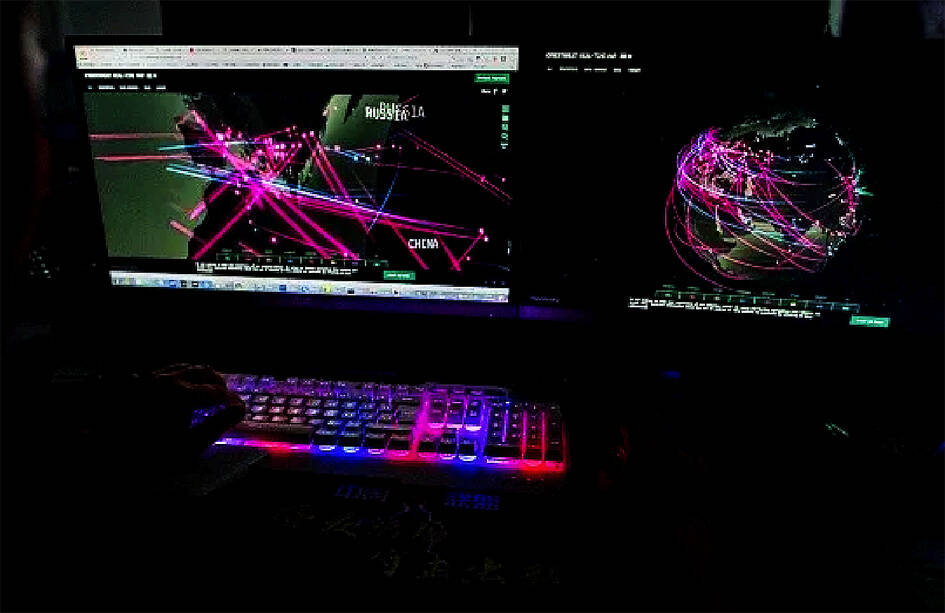Taiwanese cybersecurity specialists found 577 leaked documents which show that the Chinese Communist Party is engaging in “cognitive warfare” against Taiwan through cyberattacks and disinformation campaigns, a documentary released last month by Japanese public broadcaster NHK showed.
The filmmakers behind Tracking China’s Leaked Documents said they spent six months visiting seven countries, including Taiwan, where they interviewed members of TeamT5, a malware research and cybersecurity firm, which found the leaked documents.
TeamT5 said they discovered a string of mysterious URLs on the social media platform X, which they suspected could be accounts created by hackers or people who leaked data, which led them to the documents.

Photo: AFP
The files included technical information for launching cyberattacks, such as tools for hacking into Microsoft or Google e-mail accounts, as well as techniques for remotely controlling smartphones.
The leaked documents came from iSoon, a Shanghai-based firm that sells data obtained by hackers to the Chinese government, security agencies and state-owned enterprises.
The documents included more than 16,000 messages from chat logs of iSoon employees, indicating their relationship and dealings with Chinese security agencies and military, the documentary showed.
Many of the documents contained information on Taiwan, such as “demographic data” including names, addresses, telephone numbers; “road information data”; “architectural model data of Taiwanese cities”; and information from other databases, it said.
In the iSoon chat logs, an employee mentioned National Chengchi University (NCCU), questioning whether a university document had any special meaning. Another employee responded that “it is useful for think tanks to conduct research on cross-strait relations.”
NCCU Graduate Institute of Development Studies associate professor and chair Huang Jaw-nian (黃兆年) said the university’s server had been attacked, and some academics that had been consulted by government agencies had been targeted by hackers seeking to gain access to their e-mail accounts.
The National Center for High-Performance Computing said the hackers might have used the NCCU server as a “jump server,” attempting to obtain more important information in Taiwan.
The Internet protocol addresses mentioned in the iSoon documents matched those of Chinese hackers that many countries have already confirmed, TeamT5 said.
It added that iSoon also provided technical support for malware used by a notorious Chinese hacker organization APT41, which showed the association between iSoon and Chinese hackers.
Evidence of cognitive warfare campaigns were also found in iSoon’s leaked documents, such as online posts about spreading misinformation about a government proposal to introduce migrant workers from India, the documentary showed.
Many young women protested against the policy after reading discussions about the policy on Dcard, a popular online forum, it said.
The Taipei-based Doublethink Lab, which tracks online disinformation, said it found the original post that triggered the protest, titled “opening up to 100,000 Indian migrant workers will make Taiwan a sexual assault island,” which claimed the policy would increase incidents of sexual violence against women.
Shortly after the post, discussions on the issue grew on X, stirring unrest among young Taiwanese, many of whom voiced their opposition to the policy, it said.
Doublethink Lab analyst Lin Feng-Kai (林逢凱) said the example is an achievement of China’s cognitive warfare, as the choice of words used in the social media posts urging Taiwan not to cooperate with India implied that the authors behind the posts could be from China.

The manufacture of the remaining 28 M1A2T Abrams tanks Taiwan purchased from the US has recently been completed, and they are expected to be delivered within the next one to two months, a source said yesterday. The Ministry of National Defense is arranging cargo ships to transport the tanks to Taiwan as soon as possible, said the source, who is familiar with the matter. The estimated arrival time ranges from late this month to early next month, the source said. The 28 Abrams tanks make up the third and final batch of a total of 108 tanks, valued at about NT$40.5 billion

A group from the Taiwanese Designers in Australia association yesterday represented Taiwan at the Midsumma Pride March in Melbourne. The march, held in the St. Kilda suburb, is the city’s largest LGBTQIA+ parade and the flagship event of the annual Midsumma Festival. It attracted more than 45,000 spectators who supported the 400 groups and 10,000 marchers that participated this year, the association said. Taiwanese Designers said they organized a team to march for Taiwan this year, joining politicians, government agencies, professionals and community organizations in showing support for LGBTQIA+ people and diverse communities. As the first country in Asia to legalize same-sex

MOTIVES QUESTIONED The PLA considers Xi’s policies toward Taiwan to be driven by personal considerations rather than military assessment, the Epoch Times reports Chinese President Xi Jinping’s (習近平) latest purge of the Chinese People’s Liberation Army (PLA) leadership might have been prompted by the military’s opposition to plans of invading Taiwan, the Epoch Times said. The Chinese military opposes waging war against Taiwan by a large consensus, putting it at odds with Xi’s vision, the Falun Gong-affiliated daily said in a report on Thursday, citing anonymous sources with insight into the PLA’s inner workings. The opposition is not the opinion of a few generals, but a widely shared view among the PLA cadre, the Epoch Times cited them as saying. “Chinese forces know full well that

Travel agencies in Taiwan are working to secure alternative flights for travelers bound for New Zealand for the Lunar New Year holiday, as Air New Zealand workers are set to strike next week. The airline said that it has confirmed that the planned industrial action by its international wide-body cabin crew would go ahead on Thursday and Friday next week. While the Auckland-based carrier pledged to take reasonable measures to mitigate the impact of the workers’ strike, an Air New Zealand flight arriving at Taipei from Auckland on Thursday and another flight departing from Taipei for Auckland on Saturday would have to